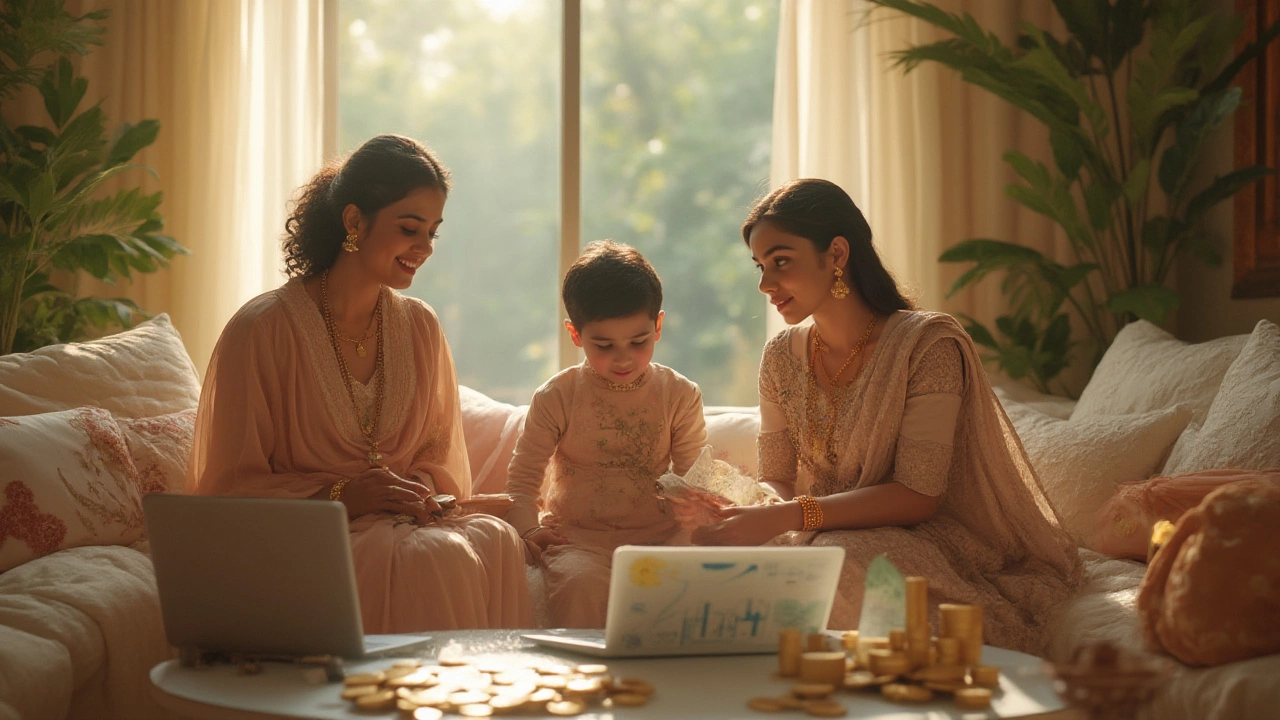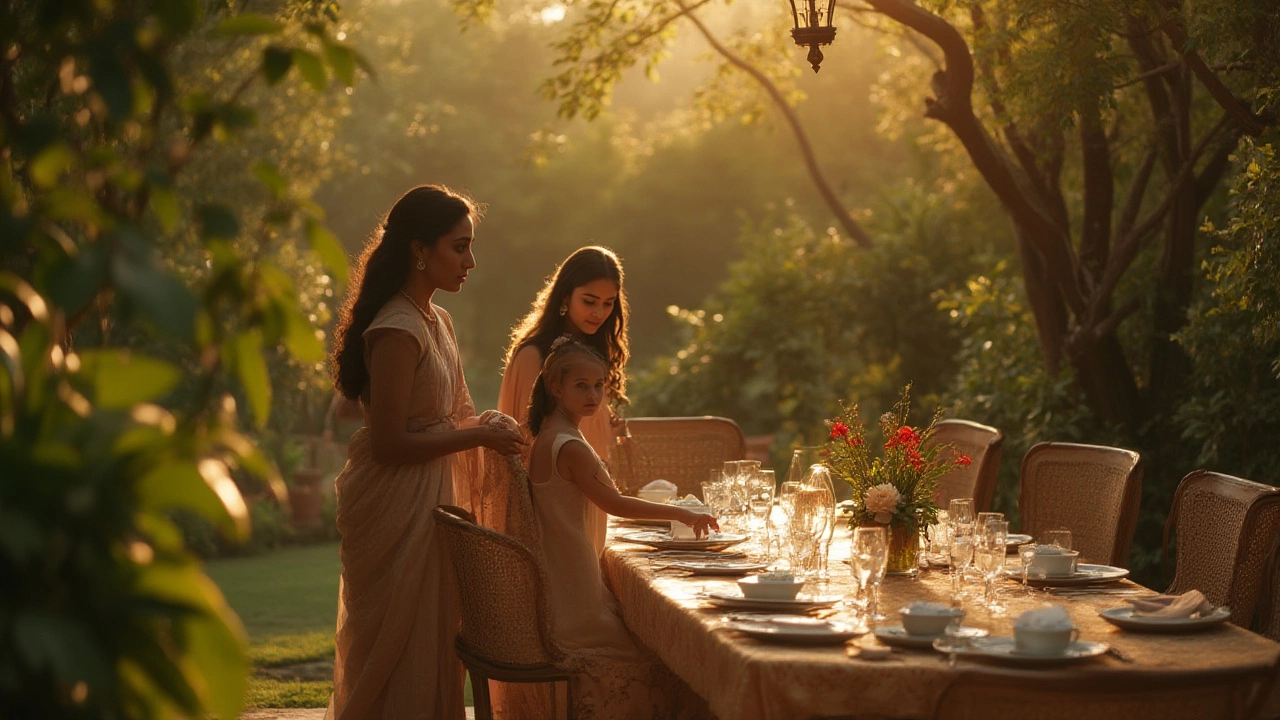Inside the Private World: What Rich Kids Learn Early On
 Jul, 21 2025
Jul, 21 2025
No one gets handed a million-dollar trust fund and a private jet manual at birth, but let’s not pretend all childhoods run on the same tracks. The personal tutors, weekends spent skiing in Aspen, or that camera-shy family office – these aren’t clichéd setups from TV shows. For plenty of rich kids, these lessons are just Tuesday. But what exactly do wealthy families teach their children behind closed doors? What goes on in those drawing rooms, board game nights, and apology brunches with prominent last names? Here’s what actually happens, stripped of movie tropes and gossip.
Money Isn't the Message—It's the Medium
For most people, pocket money means learning the value of a dollar: paper route earnings, birthday bills, maybe a piggy bank raid for lollies at seven-eleven. But in high-net-worth families, the stakes are hefty and the expectations sharper. According to UBS’s 2024 report, over 60% of ultra-wealthy Australian families start ‘structured wealth conversations’ with their kids before age 13. Picture a three-generation sit-down, spreadsheets open, estate planners on speed dial, sometimes with family fortunes dating back to Federation. Kids don’t just hear "save your money." Instead, they’re walked through asset diversification, trust structures, and how passive income works. The expectation? Learn to be a steward, not just a spender.
This kind of financial upbringing isn’t about making a quick buck. It’s strategic. They might have mock stock portfolios by age 12, or even shadow dad in real estate negotiations for beachfront property. Mistakes are analysed in forgiving but firm tones—"You lost $5000 on that virtual trading account? What did you learn?" Discussions go deep into philanthropy, too. In fact, in Australia, charitable giving is practically a rite of passage among wealthy families. Ever heard of the PAF (Private Ancillary Fund)? Many rich kids are on the boards of these family foundations before their 18th birthdays, deciding which local initiatives get a slice of millions. It’s serious responsibility in a world where money usually says yes.
There's also the flip side—what not to do. Many wealthy parents warn their kids: flashy displays get attention, and not the good kind. So, learning about discretion is just as important as knowing investment ratios. Think more sensible Toyota than bright red Ferrari for a learner’s car, at least while paparazzi might lurk at the gates. The lesson: you want to build wealth quietly, not broadcast it. Sometimes, that means being taught how to blend in: shopping at mass-market stores, understanding everyday prices, even grocery runs as a skill to avoid looking out of touch. Maintaining privacy—down to details like guarded phone numbers and untagged Instagram posts—is drilled in from an early age. The world is watching (or googling!).
But here’s a twist: many rich kids don’t have direct access to big accounts, at least not until adulthood. They might get prepaid cards with quarterly limits, sometimes tracked. Their spending habits are quietly scrutinized—not just for waste, but for self-control. Some families set up rites of passage: handle a five-figure budget for a school project, organize a fundraiser, or plan their sibling’s birthday with a real bank account. These aren’t just exercises—they’re mini-auditions for future trust and responsibility.
Want to mirror these lessons at home, even without the billions? Start having honest, age-appropriate conversations about money. Build small family investment projects, even if it’s just picking a stock together for $50. Give kids responsibility over micro-budgets—school trips, personal hobbies, or volunteering. If you treat their learning as meaningful, you plant the same seeds of stewardship and self-restraint.

The Etiquette and Networking Curriculum
You don’t appreciate the power of an introduction until you get one from someone who knows everyone. Social capital is a rich kid’s secret syllabus; it isn’t written down, but it’s everywhere. Some parents hire private etiquette tutors, but most lessons come from repeated exposure—seeing how adults handle sticky situations when everyone in the room wears a tailored suit. By the time some of these teens hit 18, they’ll have dined with ambassadors or given speeches at fundraisers where the audience includes government cabinet members. Public speaking, managing awkward silences, giving a firm handshake, speaking up at a table—these are rehearsed, not improvised.
Networking isn’t about schmoozing for favours. It’s about building relationships with people across industries and generations. Kids learn how to remember names, how to write handwritten thank-you notes, and how to politely extract themselves from a conversation gone dry. They’re coached on not asking for selfies with celebrities, and instead quietly respecting privacy. Ever notice how some events explicitly ban phones? That’s deliberate—to teach focus on people, not devices.
Charity galas, art auctions, and sporting events serve as casual classrooms. Here’s a kid expected to hold their own in a debate with adults—about climate action, new business trends, or art history. One Melbourne family reportedly enrolled their twins in the city’s top wine tasting course—at sixteen—not to push drinking, but to train them in the art of discernment and conversation about something besides school or TikTok. Small talk is practiced, but so is active listening—a skill many of us forget to teach.
There’s a sharper edge, too. Mistakes travel quickly in these circles—one offensive comment and you’ve embarrassed not only yourself, but the family legacy. So, kids are taught the art of apology, of owning up with grace, and making things right. Some families do q&a practice sessions, grilling their kids on what to say if caught in a scandal, or how to spin a bad headline. Not to create robots—just to minimize risk, because reputations are family assets, just like land or shares.
But none of this works without empathy. Real, hands-on charity work is expected—at soup kitchens, aged-care facilities, bushfire recovery programs. Rich kids see the world outside their comfort bubbles, not just for optics but for grounding. One famous Australian mining family, for example, sent their youngest to work a full season on a remote cattle farm—without staff, catered lunches, or phone service. They got dirt under their nails, sore backs, and a much better grasp on humility. After all, privilege is supposed to be invisible, not a badge you clip on for VIP access. Families say kids should use their connections to lift others up, not wall themselves off.
Even dinner isn’t wasted time: it’s practice for conversation and negotiation. No phones at the table, and everyone has to share an opinion. Arguments—about politics, culture, whatever was on the news—are encouraged, as long as they’re respectful and backed by facts. Getting comfortable with disagreement—and hearing constructive criticism without melting or lashing out—is part of emotional training. As these kids grow into adulthood, that social IQ becomes as vital as financial know-how.

Resilience, Pressure, and the True Test of Privilege
It’s easy to stereotype rich kids as spoiled, soft, or immune from regular life’s headaches. But growing up in the wealth spotlight brings its own invisible challenges. High expectations? Absolutely. One wrong headline, bad grades, or crazy party photo, and suddenly the media or family shareholders are peering in. It’s a pressure cooker. According to a 2023 study from the University of Sydney, teens from high-wealth families report higher levels of performance anxiety—especially when they’re being groomed to eventually run a business, foundation, or just “make something” of themselves. There’s often an unspoken “don’t mess this up for us.”
Kids are taught early how to manage stress. Some families invest in mindfulness coaches, resilience workshops, and regular therapy sessions—not because it’s trendy, but because the stakes are real. There’s usually little margin for public error, so skills like crisis response, apologizing effectively, and moving forward under scrutiny get drilled in. Social media? Imagine every post, comment, or selfie being screenshot by tabloids or competitors. Some kids have media training before they’ve ever heard the phrase “cancellation culture.” That’s not paranoia; it’s protection.
The old adage “to whom much is given, much is expected” isn’t just a family motto—it’s enforced. Rich kids learn quickly that status can attract jealousy or resentment. Many are told to keep quiet about holidays, avoid showcasing luxuries at school, and try to build genuine friendships with people from different backgrounds. If you think that’s easy, try navigating a high school clique when you arrive by chauffeur but crave being treated like everyone else. It’s why some deliberately take gap years working low-paid jobs or volunteering abroad, to get comfortable in their own skin outside the gated world.
The conversation about mental health is slowly getting louder in these circles. Some families now openly discuss therapy, failure, and mistakes. One Melbourne heir described his parents’ approach: “Fail hard, but fail where it’s safe. If you screw it up, we want to see you bounce back, not hide it.” That means celebrating recoveries as strongly as successes. Want a tip to borrow from this? Don’t just ask kids to share “highs,” but also their “lows” over dinner; show that even with advantage, struggles are normal, and recovery is possible.
At the centre of everything is the lesson that privilege isn’t just a cushion—it's an amplifier. You mess up, it’s visible. But you do something right, the impact can be huge. For kids in wealthy families, understanding that privilege is a tool, not an identity, is the most vital lesson. It’s why so many are pushed to find real purpose—start-ups that do good, social ventures, meaningful art—not just money-hoarding schemes. If privilege is inherited, so is the obligation to make it count, not just for themselves, but for the circles they move in and the communities they touch.